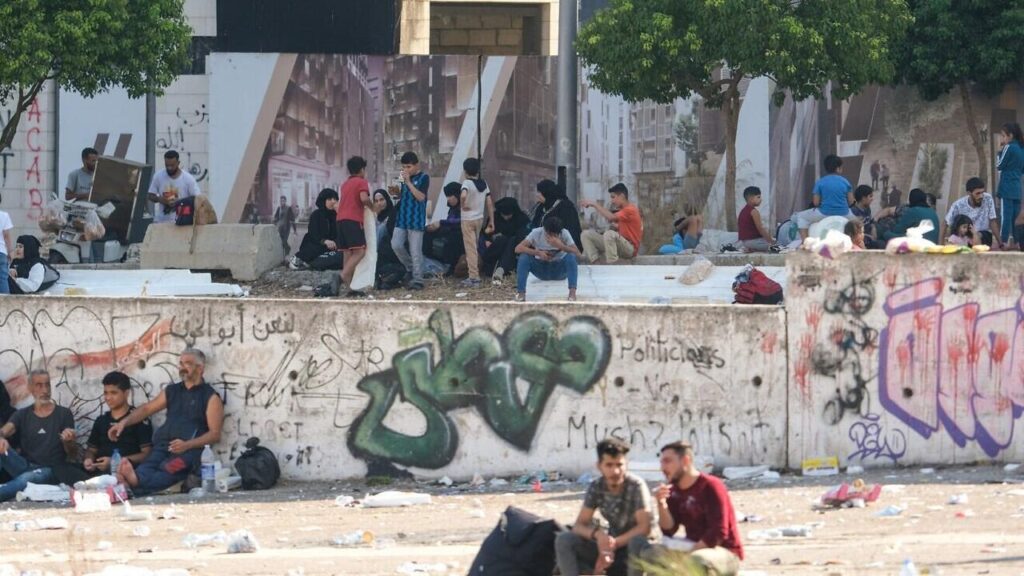The ongoing conflict in Lebanon has escalated dramatically in recent days, leading to a looming humanitarian crisis as approximately one million people may be displaced due to intense Israeli airstrikes targeting the country’s capital and southern regions. Caretaker Prime Minister Najib Mikati has indicated that this could represent one of the largest movements of displacement ever witnessed in Lebanon’s history. Following an emergency cabinet meeting, Mikati stated, “The number of displaced people… could reach a million,” a sentiment echoed by Caretaker Environment Minister Nasser Yassin, who highlighted that approximately 250,000 individuals have already sought refuge in government-sanctioned and informal shelters. However, Yassin further emphasized that the total number of those directly affected or displaced is likely four times greater than the reported shelter occupancy.
The situation has evolved as hundreds of thousands of Lebanese have fled from their homes, particularly in the southern cities and the suburbs of Beirut, as airstrikes continue to ravage the region. Many families are left without adequate shelter, often resorting to sleeping in public spaces, as the existing shelters have quickly reached capacity. The UN Office for the Coordination of Humanitarian Affairs (OCHA) has made it clear that humanitarian needs in Lebanon are at unprecedented levels, completely exhausting current resources. Since the onset of the conflict, over 22,000 displaced Syrians have returned to Syria, alongside a similar number of Lebanese citizens, indicating a mass exodus as the violence deepens.
Intensifying the crisis is the continuous barrage of attacks which particularly escalated on Friday when 82 bombs struck residential buildings in the Beirut suburb of Dahiye, resulting in significant casualties, including the deaths of prominent figures such as Hezbollah Secretary-General Hassan Nasrallah and two other senior commanders. Subsequently, as of Saturday, the Lebanese health ministry reported that approximately 1,640 people have been killed, and over 8,400 have sustained injuries as a direct consequence of these Israeli strikes. The gravity of the situation is compounded by the uncertainty and fear that have engulfed the population as the violence persists unabated.
In addition to the immediate humanitarian crisis triggered by these violent assaults, Lebanon’s plight is magnified by the ongoing economic collapse that has left over 80 percent of its population living below the poverty line. The country’s energy infrastructure is in dire straits as well, with the state reportedly supplying as little as two hours of electricity per day. This precarious situation creates a dual burden; citizens are not only struggling to cope with displacement and insecurity but are also facing severe shortages in basic services and necessities. The intersection of these crises complicates the humanitarian response, leaving thousands of vulnerable individuals amidst desperation.
The current violence has had ripple effects beyond the immediate borders of Lebanon as columns of refugees appear to be on the move towards Europe through Syria, seeking safety and stability amid the chaos. Social media reports illustrate this tough journey as families flee their homes, illustrating the scale of the crisis. The international community continues to monitor events closely, striving to respond to an escalating situation that threatens to destabilize the region further. Efforts for humanitarian aid are critically needed, yet current resources are challenged by the overwhelming number of displaced individuals and the growing requirement for basic sustenance.
In this context, the call for increased international support becomes increasingly urgent, as Lebanon grapples not only with the consequences of war but also the weight of a long-standing economic crisis. The interconnected layers of conflict, displacement, and economic turmoil lay bare the vulnerability of Lebanon, revealing deep-seated issues that require attention and action. Without intervention and support, the potential for further escalation and suffering remains stark, suggesting that the complexities of this situation will take considerable effort to resolve. The unfolding humanitarian crisis demands a collective response to ensure the safety and dignity of those affected by this devastating turn of events in Lebanon’s ongoing struggle for peace and stability.

